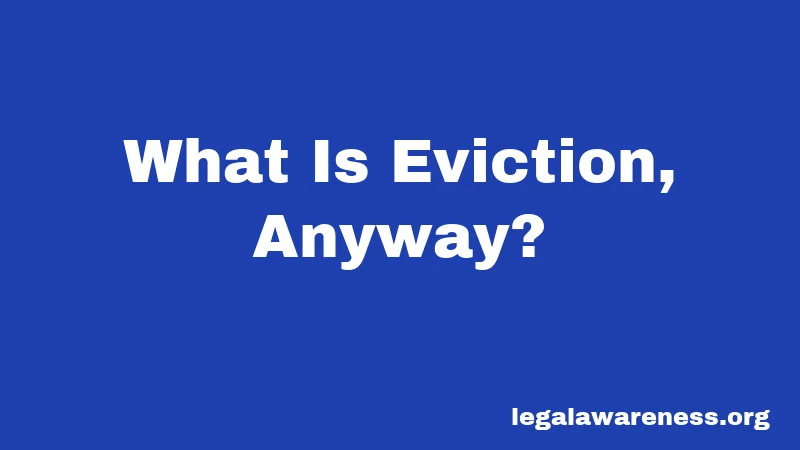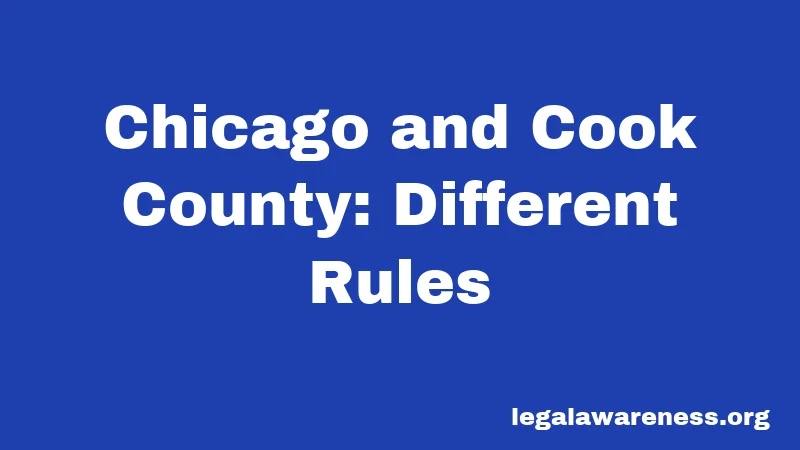Illinois Eviction Laws in 2026: What Renters and Landlords Really Need to Know
Most people don’t understand how eviction actually works. Not really. You might think a landlord can just throw you out whenever. Wrong. Or maybe you think you have unlimited time to pay rent. Also wrong. Illinois eviction laws are strict, and they matter. Let’s break down exactly what’s happening in 2026.
Whether you’re renting an apartment in Chicago or a house downstate, these laws affect you. Period. Understanding them now means you won’t get blindsided later. Trust me, this is worth reading.
What Is Eviction, Anyway?

Eviction is the legal process a landlord uses to remove you from a rental property. It’s not when someone locks you out or shuts off your power. That’s illegal. Eviction only happens through the court system. A judge has to be involved. A sheriff has to be involved. It’s official. It’s formal. It’s serious.
Think of it like a trespassing case, but with extra steps. There’s proper notice. There’s a hearing. There’s documentation. No shortcuts allowed.
The Main Reasons You Can Get Evicted
Here’s where it gets real. Illinois landlords can’t just evict you for no reason. Wait, actually, they kind of can—but only if your lease ends. For now, let me explain the situations where eviction is most likely.
Not Paying Rent (The Most Common Reason)
This one’s straightforward. You owe rent. It’s due. If you don’t pay it, the clock starts ticking.
Rent is considered late the day after it’s due. No grace period unless your lease says otherwise. Once you’re late, your landlord can give you a 5-day notice to pay or quit. That means you have five days to pay the full amount or move out.
Sound simple? Here’s where people mess up. Paying part of the rent doesn’t count. Only full payment stops the eviction process. In state law, half payment doesn’t cut it. Your landlord can still move forward with court.
But wait—Chicago is different. If you live in Chicago or Cook County, it’s another story. In those places, if your landlord accepts any rent from you, they can’t evict you for nonpayment. That’s actually a major protection.
Breaking Your Lease Agreement
Lease violations cover a lot of ground. Unauthorized pets. Too many people living there. Excessive noise. Property damage. Illegal activity. Pretty much anything that violates the written lease can be grounds for eviction.
For lease violations, you get a 10-day notice to cure or quit. That means you have 10 days to fix the problem or leave. If you fix it within those 10 days, the eviction process usually stops.
Here’s what many people don’t know: if you mess up the same way again within six months, your landlord might be able to skip the “fix it” option and go straight to a 14-day notice to terminate. Documentation matters.
Your Lease Ends and You Won’t Leave
Your lease is over. Done. Finished. But you’re still there. Your landlord wants you out. They can issue you a 7-day, 30-day, or 60-day notice depending on your lease type.
For week-to-week leases, it’s seven days. Month-to-month is 30 days. Yearly leases get 60 days. Pretty straightforward.
Criminal Activity
Okay, this one’s serious. If the landlord has evidence you’re dealing drugs, running a meth lab, or using a firearm illegally on the property, that’s grounds for eviction. This isn’t about being suspected. This is about verified criminal activity. The law is really specific about what counts.
The New Protections You Have in 2025 (And Into 2026)

Stay with me here—this is important.
The Landlord Retaliation Act took effect on January 1, 2025. This law protects you from retaliation. Here’s what that means: if you report code violations, ask for repairs, or complain to authorities about unsafe conditions, your landlord cannot retaliate by evicting you, raising your rent, reducing services, or threatening lawsuits.
If your landlord tries to punish you within one year of you exercising those rights, it’s assumed to be retaliation. Unless they can prove otherwise, you have a strong defense. You can even sue for damages. This is huge.
You’re not alone—this confuses many tenants and landlords alike. Make sure you understand this protection.
Another recent change: landlords now have to accept reusable tenant screening reports. That report can’t be older than 30 days. If you bring one, they can’t charge you an application or screening fee. This saves you money and time.
The Actual Eviction Process (Step by Step)
Wondering what actually happens? Here’s the timeline.
Step 1: The Notice
Your landlord serves you written notice. For nonpayment, it’s 5 days. For lease violations, it’s 10 days. For lease endings, it’s 7, 30, or 60 days depending on your situation. This isn’t optional. It has to happen first.
The notice must come one of two ways: hand-delivered to you OR sent by certified mail. Posting it on your door isn’t enough. If your landlord tries to serve you that way, you can get the case dismissed.
Step 2: The Notice Period Expires
You either pay the rent, fix the violation, or move out. Or you don’t. If you don’t, your landlord can move forward.
Step 3: Filing the Eviction Lawsuit
Your landlord files an eviction complaint in circuit court. This is the official start of the legal process. They have to do this in the county where your rental property is located. Filing fees vary by county, but they’re typically $200–$500.
Step 4: You Get Served Court Papers
The sheriff or a certified process server delivers the summons and complaint to you. This has to happen at least three days before your court hearing. You have the right to know about the hearing. No sneaking around.
If you’re not home, a process server can give the papers to someone in your household who’s over 13 years old. But they can’t just leave them on the door.
Step 5: The Court Hearing
You and your landlord show up in front of a judge. Bring documentation. Bring receipts. Bring evidence. This is your chance to defend yourself.
Maybe you actually did pay the rent and have proof. Maybe the notice was served illegally. Maybe there’s a lease violation you fixed. Present it all. A judge will listen.
Step 6: The Judgment
The judge decides. Either eviction proceeds or it doesn’t. If you win, the case is over. If you lose, you’re not done yet.
Step 7: Your Time to Move
You get seven to 14 days after judgment to vacate. This isn’t a suggestion. This is court-ordered. You need to move during this window.
Step 8: Sheriff Enforcement (If Needed)
If you’re still there after 14 days, the sheriff physically removes you. You don’t get to stay. The landlord doesn’t do it themselves. Only the sheriff can enforce the removal.
This whole process typically takes 5 to 90 days. Sometimes longer. Court backlogs happen. But the minimum timeline is firm.
Chicago and Cook County: Different Rules

Illinois sets the baseline, but Chicago and Cook County have their own rules. And honestly, they’re stricter.
In Chicago, the Residential Landlord and Tenant Ordinance (RLTO) applies. Cook County RTLO covers unincorporated areas. These local laws give you more protection than state law alone.
Remember that partial rent rule? In Chicago and Cook County, if a landlord accepts any rent payment, they can’t evict you for nonpayment. Not for the rent that month anyway.
Chicago is also considering a “Just Cause” ordinance. As of May 2025, it was introduced to City Council. If passed, landlords would only be able to evict for specific reasons. No more evictions for no reason at all. This is still pending, but watch your local news on this one.
The New Retaliation Law: A Game-Changer
Here’s the part most people miss.
Starting January 1, 2025, if you engaged in protected activity—like reporting housing code violations to the city—your landlord can’t evict you, raise your rent, reduce services, refuse to renew your lease, or threaten legal action within one year.
Protected activity includes: reporting health and safety violations, complaining to authorities, seeking help from tenant organizations, testifying in court, or organizing with other tenants.
If your landlord takes action against you within one year of your complaint, the law assumes it’s retaliation. That’s a huge shift. Normally, you’d have to prove intent. Now they have to prove it wasn’t retaliation.
You can defend yourself in an eviction case using this law. You can also sue separately for damages. The law even allows you to recover twice what you actually lost, plus attorney fees.
This is powerful. Use it.
Special Circumstances and Exceptions
Okay, there are some situations that don’t fit neatly.
Military Members
If you’re on active military duty and get deployed, that affects your eviction timeline. Illinois law has special protections for service members and their families.
Squatters vs. Tenants
Here’s a new one. As of January 2026, new law (SB1563) clarifies that squatters aren’t the same as tenants. A squatter is someone with no legal right to be there at all. Law enforcement can now remove squatters without going through the full eviction process. This is separate from regular eviction law.
Winter Moratorium in Cook County
This is important if you’re in Chicago or Cook County. From December 19, 2025, through January 5, 2026, the sheriff cannot physically remove anyone from a home due to eviction. It’s a winter protection thing—no families get thrown out during the holidays.
But here’s the catch: this only pauses the physical removal. Landlords can still file lawsuits. Courts can still enter judgments. The eviction doesn’t go away. It just gets delayed.
Also, if the temperature drops to 15 degrees Fahrenheit or below, evictions get postponed on those days. Cold matters.
What Landlords Cannot Do
Let’s be clear about what’s illegal, even if you’re behind on rent.
Your landlord cannot lock you out. They cannot shut off your heat, water, electricity, or other utilities. They cannot remove your personal belongings. They cannot file for eviction without proper notice. They cannot serve you illegally. They cannot retaliate against you for exercising your legal rights.
Do any of these things happen to you? Document everything. Photos. Dates. Times. Contact an attorney or legal aid.
Only the sheriff can remove you from a property. Not a landlord. Not a property manager. Not a security company. The sheriff. Period.
Your Defense Options
You can fight this. Seriously.
If your landlord didn’t serve notice correctly, that’s a dismissal. If they didn’t serve you according to law, you can ask the court to throw out the case. File a motion to dismiss.
If the notice period was too short, that matters. If they tried to serve you on the door instead of handing it to you or sending certified mail, that’s improper service.
If you actually paid the rent, bring proof. Bank statements. Canceled checks. Money transfer receipts. If you fixed the lease violation within the time allowed, bring evidence of that too.
If your landlord is retaliating, use that law as your defense. If you can show you engaged in protected activity within one year of the eviction notice, you have a strong case.
If there’s a procedural error—a wrong date, incorrect property description, missing signatures—those matter. The court takes compliance seriously.
The Timeline: How Long Does This Really Take?
People want to know: how long until I actually have to leave?
Best case scenario? If you don’t show up to court or don’t fight it, maybe 30 days from notice to eviction.
Typical case? 45 to 90 days. The notice period alone is 5 to 60 days depending on the reason. Then filing takes a few days. The court hearing might take weeks to schedule. The appeal or judgment period takes more time. Then the sheriff enforces it.
Worst case? Three to six months, especially if the court is backed up or you file motions to delay things.
Know what matters most? Whether you cooperate. If you ignore the process, it speeds up. If you engage and file motions, it slows down.
How to Handle an Eviction Notice
You got served. Your heart sank. What now?
First, don’t panic. You have time. How much depends on the reason.
Read everything carefully. Make sure the notice states the correct reason, the correct property address, and the correct time periods. Check if they served you correctly—hand-delivered or certified mail only.
If you can fix the problem, do it immediately. For lease violations, if you can resolve it in the timeframe given, the eviction often stops. Get written confirmation from your landlord that the issue is resolved.
If you can’t fix it, start looking for a new place. Give yourself the full time period. Use it wisely.
If you think the notice is wrong, consult with legal aid or a lawyer. Many communities offer free eviction help. Illinois Legal Aid Online can point you in the right direction.
If you plan to fight it, go to the court hearing. Don’t skip it. Show up, bring evidence, and present your case.
Getting Legal Help
You’re not alone in this. Free help exists.
Illinois Legal Aid Online has a dedicated Eviction Help page. Text ‘eviction’ to ILAOHelps at 85622 to apply for free legal help. In Cook County, Cook County Legal Aid focuses on housing cases.
Many community organizations offer tenant rights workshops. The Chicago Housing Justice Coalition is active. The Lawyers’ Committee for Better Housing helps tenants fight back.
A lawyer isn’t always necessary, but having someone in your corner who understands the law makes a huge difference. These organizations get that.
What Happens After Eviction?
You’re out. Now what?
First, know that evictions stay on your record. They show up on tenant screening reports. Future landlords see them. They might not rent to you. Or they’ll charge more in security deposits.
But here’s the thing: sealed records exist. If you request it, the court can seal your eviction file under certain circumstances. This removes it from public view and makes your rental history cleaner.
Second, any judgment your landlord got stays on your record unless you pay it off. If you owe back rent plus court costs, that debt follows you. The landlord can try to collect for years.
Third, try to resolve it. If you can pay the back rent before you’re evicted, do it. The eviction might not happen. If you’re evicted, try to negotiate a payment plan afterward. Getting closure is worth something.
FAQ: The Questions Everyone Asks
Can my landlord evict me just because they want to?
In Illinois state law, yes—if your lease ends and they don’t renew it. But in Chicago, a “Just Cause” ordinance was introduced in 2025. If passed, no-fault evictions would end. For now, check your local rules.
What if I pay part of the rent? Does that stop eviction?
In state law, no. Only full payment stops it. In Chicago and Cook County, yes—any payment accepted stops the eviction.
How long do I have before the sheriff removes me?
Seven to 14 days after the judge rules against you. Use that time to move.
Can my landlord lock me out without going to court?
No. That’s illegal in Illinois, even if you owe rent. Only the sheriff can remove you through eviction.
What if the landlord served me incorrectly?
You can get the case dismissed. Hand delivery or certified mail only. Door posting doesn’t count.
Can I fight an eviction on my own without a lawyer?
Yes, but it’s harder. You need to understand the law and present a coherent defense. Get help if you can.
Does eviction ruin my credit permanently?
It shows up on tenant screening reports forever, unless sealed. But credit-wise, only court judgments affect your credit score directly.
What about winter evictions?
From December 19, 2025, through January 5, 2026, Cook County doesn’t allow physical removal. Also, if it’s 15 degrees or colder, removals get postponed.
Final Thoughts
Eviction laws in Illinois exist to protect both sides. Landlords get due process. Tenants get notice and a chance to respond. It’s not perfect, but it’s the system.
Stay on top of your rent. Maintain your property. Know your rights. If something doesn’t feel right, get legal help. Organizations exist to support you.
If you’re a landlord, follow the law to the letter. Serving improper notice tanks your case. Document everything. Consult an attorney.
Now you know the basics. Stay informed, stay safe, and when in doubt, look it up or ask a lawyer. You’ve got this.
References
Illinois Code of Civil Procedure – Article IX (Eviction Laws)
Illinois Attorney General – Landlord and Tenant Rights and Laws
Illinois Legal Aid Online – Understanding Eviction and Tenant Rights
Cook County Residential Landlord and Tenant Ordinance (RLTO)
Governor Pritzker Signs SB1563 – Squatter Protections (January 2026)
Chicago Housing Justice Coalition – Just Cause Ordinance Initiative
Illinois Landlord Retaliation Act (765 ILCS 721/5) – Effective January 1, 2025
